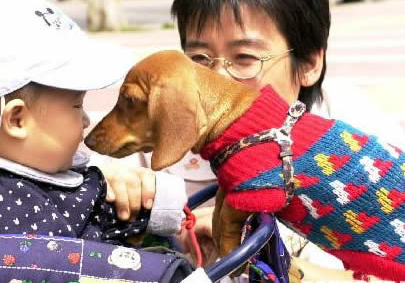(单词翻译:单击)

A dog could be a baby's best friend, according to a study in the medical journal Pediatrics.
医学杂志《儿科学》(Pediatrics)上发布的一项研究报告显示,狗可能是婴儿最好的朋友。
Infants living in households with dogs were healthier and had fewer ear infections than those without a dog, the study found. Researchers also found that cats appeared to offer some protection, but the link wasn't as strong.
该研究发现,养狗家庭的婴儿比无狗家庭的婴儿更健康,并且也较少患耳部炎症。研究人员还发现,猫似乎能提供一些保护,但两者的关联没那么强。
The study, posted online Monday and based on 397 children who lived in rural and suburban parts of Finland, examined whether contact with dogs and cats during a baby's first year offers any protection from respiratory tract infections, such as colds and resulting common ear infections. 'The children having dogs at home were healthier, they had less ear infections and they needed less antibiotics,' said Eija Bergroth, the study's lead author and a pediatrician affiliated with Kuopio University Hospital in Kuopio, Finland.
这份7月9日上线的研究报告追踪了生活在芬兰乡村和郊区的397名儿童,考查了婴儿一岁以内与猫狗的接触是否能保护其免遭呼吸道感染的侵害,例如感冒和常见的并发耳部感染。报告首席作者、芬兰库奥皮奥大学医院(Kuopio University Hospital)的儿科大夫艾嘉•伯格罗斯(Eija Bergroth)说,养狗家庭的小孩更健康,他们患耳炎的情况较少,需要的抗生素也比较少。
One measure showed children with dogs were reported as being healthy for about 73% of the time, based on weekly questionnaires, compared with about 65% of children with no dog contact at home. While the study tracked just under 400 babies, the researchers said the results were statistically significant because it relied on weekly questionnaires filled out by parents.
该研究中基于每周问卷调查的统计显示,养狗家庭小孩约73%的时间都是健康状态,而无狗家庭小孩的这一比例约为65%。尽管研究只追踪了不到400名小孩,但研究者称这些结果在统计学上具有显著意义,因为它依靠的是家长们填写的每周问卷。
Dr. Bergroth explained that children who lived in households where dogs spent 18 or more hours a day outside, showed the most healthy days, fewer fevers and the least use of antibiotics compared with babies with no dog at home. One theory is dogs that spend a lot of time outside likely bring more dirt and bacteria inside the home compared with dogs and cats that spend more time indoors, she said. Researchers believe that exposure to dirt and bacteria builds up babies' immune systems.
伯格罗斯博士解释说,与无狗家庭的小孩相比,那些每日在户外时间18小时以上的狗所属家庭的小孩健康的天数最多,更少发烧,抗生素的使用也最少。她说,一种理论是,长时间在户外活动的狗可能比常在室内的狗和猫带回更多尘土和细菌。研究人员认为接触尘土和细菌会增强宝宝的免疫系统。
Researchers found that 97% of babies-whose mothers were enrolled in the study during pregnancy-had a runny nose at some point during the study, most had a cough and about 40% had an ear infection. Nearly half of the children needed antibiotics.
研究人员发现,97%的宝宝──他们的母亲在怀孕期间就加入了这项研究──在研究期间出现过流鼻涕的症状,大部分宝宝患过咳嗽,约40%患过耳炎。将近一半的宝宝需要使用抗生素治疗。
Earlier studies using smaller samples of children have shown conflicting results on the impact of animal exposure on infections and allergies, though a study funded by the National Institutes of Health showed children exposed to two or more dogs or cats in their first year had lower chances of later developing all kinds of allergies than children exposed to one or no pets.
早前以较少儿童做样本的研究得出过相反的结论,认为接触动物对炎症和过敏有不良影响,不过一项由美国国立卫生研究院(National Institutes of Health)资助的研究显示,一岁以前接触两只或更多的狗或猫的小孩日后罹患各类过敏症的几率比只接触一只或不接触宠物的小孩要低得多。
Dr. Bergroth's study involved children who were born at Kuopio University Hospital in Finland between September 2002 and May 2005. The children's parents were given weekly questionnaires from the time their babies were nine weeks old until they were 1 year old. The questionnaires asked if the children had been 'hale and hearty' in the past seven days. If the child wasn't healthy parents were asked to document ailments like fever, cough, runny nose, ear infection, diarrhea, urinary tract infection or rash. Families were also asked each week if they had a dog or a cat at home and how much time the animals spent outside.
伯格罗斯博士研究中的小孩是2002年9月至2005年5月之间在芬兰库奥皮奥大学医院出生的。从孩子九周至一岁,他们的父母每周会收到问卷,调查小孩在过去七天里是否“生龙活虎”。如果孩子不健康,父母被需要记录下他们的病情,比如发烧、咳嗽、流鼻涕、耳部炎症、腹泻、尿路感染或皮疹。问卷同时还问及这些家庭是否养狗或养猫,以及宠物在户外的活动时长。
The study results were tabulated looking at responses on the weekly questionnaires rather than individual children. Researchers analyzed the data in different ways to rule out other factors that could influence infection rates like breastfeeding, low-birth weight, the number of siblings and whether moms smoked during pregnancy.
研究人员将结果制成表格,研究每周的问卷反馈,而不是单个小孩。研究人员以不同方式分析了数据,从而排除了其他可能影响炎症发生率的因素,比如母乳、低出生体重、兄弟姐妹数量,以及妈妈怀孕期间是否抽烟。


